Week13 Reading Unit5 各小组讨论work to live or live to work 和预习讲义单词分析
- 格式:pdf
- 大小:832.31 KB
- 文档页数:39
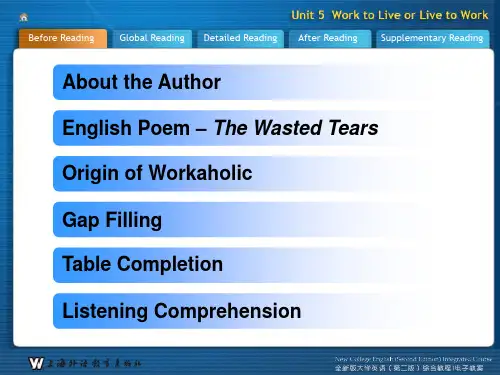
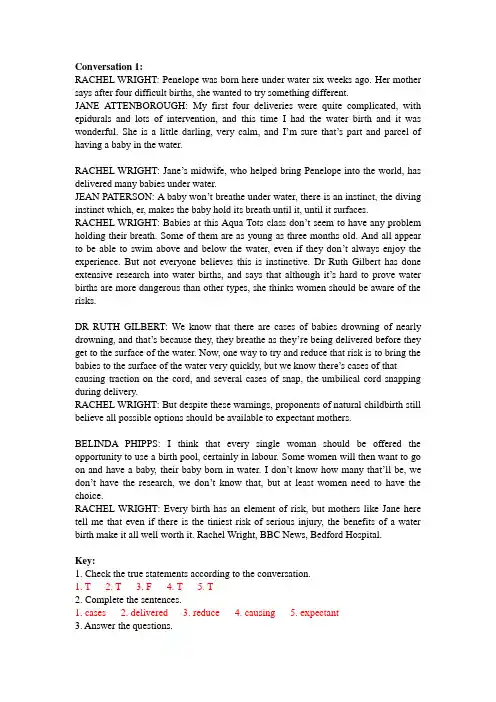
Conversation 1:RACHEL WRIGHT: Penelope was born here under water six weeks ago. Her mother says after four difficult births, she wanted to try something different.JANE ATTENBOROUGH: My first four deliveries were quite complicated, with epidurals and lots of intervention, and this time I had the water birth and it was wonderful. She is a little darling, very calm, and I’m sure that’s part and parcel of having a baby in the water.RACHEL WRIGHT: Jane’s midwife, who helped bring Penelope into the world, has delivered many babies under water.JEAN PATERSON: A baby won’t breathe under water, there is an instinct, the diving instinct which, er, makes the baby hold its breath until it, until it surfaces.RACHEL WRIGHT: Babies at this Aqua Tots class don’t seem to have any problem holding their breath. Some of them are as young as three months old. And all appear to be able to swim above and below the water, even if they don’t always enjoy the experience. But not everyone believes this is instinctive. Dr Ruth Gilbert has done extensive research into water births, and says that although it’s hard to prove water births are more dangerous than other types, she thinks women should be aware of the risks.DR RUTH GILBERT: We know that there are cases of babies drowning of nearly drowning, and that’s because they, they breathe as they’re being delivered before they get to the surface of the water. Now, one way to try and reduce that risk is to bring the babies to the surface of the water very quickly, but we know ther e’s cases of that causing traction on the cord, and several cases of snap, the umbilical cord snapping during delivery.RACHEL WRIGHT: But despite these warnings, proponents of natural childbirth still believe all possible options should be available to expectant mothers.BELINDA PHIPPS: I think that every single woman should be offered the opportunity to use a birth pool, certainly in labour. Some women will then want to go on and have a baby, their baby born in water. I don’t know how many that’ll be, we don’t have the research, we don’t know that, but at least women need to have the choice.RACHEL WRIGHT: Every birth has an element of risk, but mothers like Jane here tell me that even if there is the tiniest risk of serious injury, the benefits of a water birth make it all well worth it. Rachel Wright, BBC News, Bedford Hospital.Key:1. Check the true statements according to the conversation.1. T2. T3. F4. T5. T2. Complete the sentences.1. cases2. delivered3. reduce4. causing5. expectant3. Answer the questions.1. Breathe.2. Three months old.3. Swim above and below the water.4. Research into water births.5. The risks of water births.Conversation 2:TOM HEAP: A late autumn day and sin is beginning to warm the vines. It’s sweetening the fruit and even producing a rare sight in an English vineyard: bunches of fully ripened, lush, black grapes. But the important thing about this year’s weather is that it’s done to the flesh of the grape. The warm but relatively moist summer means ther e’s plenty of juice in them, and the hot sunny September means that that juice is very sweet. The two things, a recipe for a tasty and full-bodies wine.TOM HEAP: There are actually fewer bunches on the vine this year, Rainstorms in July spoiled some of the yond buds, so the plants put more effort into the fruit that remains. Nature has made more sugar which fermentation turns to alcohol.MAN 1: We’ve had a very, very god ripening period at the end of the year which has meant that we’ve got beautifully ripe grapes, lots of flavor, lots of character, and some of the wines that are in these tanks are going to rival some of the best wine produced in Europe this year.TOM HEAP: There’ll only be proof, of course, when it’s ready to drink next summer. TOM HEAP: And this is a typical proving ground. London’s Crescent Wine Bar doesn’t currently stock English wine. It’s going to be a hard sell.WOMAN 1: Er, I don’t think I’ve ever drunk English wine.MAN 2: Why would you buy a wine for yourself you know nothing about with a very bad reputation?WOMAN 2: You think of England, you think of ale, cider. You don’t think of wine. MAN 3: So if you give a bit of air, swirl it round …TOM HEAP: But the critics think our palates could be in for a surprise.MAN 3: On the dry white wines, we’re going to have wines with a lot more flavor, a lot more intensity, which is, which is wonderful. They’ll still be fresh and crisp but they’ll have a lot more fruit flavor, which is, which everybody likes. And this year we’re going to make some nice reds, which makes a change, so you’ll be able to have some good reds for once.TOM HEAP: Less than one per cent of the wine drunk in this country comes from our own vines. The growers’ fervent wish is that this good vintage will change the image of English wine and permanently boost consumption, even when the weather is not so kind. Tom Heap, BBC News, Gloucestershire.Key:1. Choose the best answer to the questions.1. B2. A3. A4. C5. B2. Answer the questions.1. Bunches of grapes.2. Rainstorms in July.3. Fermentation.4. A very good ripening period.5. Next summer.3. Check the true statements according to the conversation.1. T2. F3. T4. T5. TPassage 1:Since we've been discussing alternative fuels lately, I wanted to pass on to you some information I read about a new fuel that's been in the news a lot lately. It's called A-21. It's composed of water and a chemical known as naphtha. It seems to be a very promising fuel because it's much cleaner than the gasoline that we use today. That's not to say that it doesn't pollute, but it is cleaner. A-21 isn't like some other alternative fuels that require completely new types of engines. A-21 still works in regular, everyday combustion engines - like the ones in cars with onlyminor mechanical modifications. So changing over wouldn't be a big deal. You may doubt some of these claims as many researchers have. Some people feared that because it contains about 45% water, it would freeze in the winter. But a small amount of antifreeze was added to it, and that seems to have solved the problem. A-21 has recently undergone street tests in buses in Reno, Nevada. So far it seems to work just fine. This is a good thing, especially in Nevada, because the state government there has passed a law requiring that a large percentage of vehicles in Nevada run on alternative fuels. A-21 should help.Key:1. alternative2. composed3. promising4. pollute5. minor6. claims7. 45%8. added9. undergone 10. vehicles Passage 2:I'm glad you brought up the question of our investigations into the makeup of the Earth's interior. In fact, since this is the topic of your reading assignment for next time, let me spend these last few minutes of class talking about it. There were several important discoveries in the early part of this century that helped geologists develop a more accurate picture of the Earth's interior. The first key discovery had to do with seismic waves, remember they are the vibrations caused by earthquakes. Well, scientists found that they travelled thousands of miles through the Earth's interior. This finding enabled geologists to study the inner parts of the Earth. You see these studies revealed that these vibrations were of two types: compression or P waves andshear or S waves. And researchers found that P waves travel through both liquids and solids, while S waves travel only through solid matter. In 1906 a British geologist discovered that P waves slowed down at a certain depth but kept travelling deeper. On the other hand, S waves either disappeared or were reflected back, so he concluded that the depth marked the boundary between a solid mantle and a liquid core. Three years later another boundary was discovered - that between the mantle and the Earth's crust. There's still a lot to be learned about the Earth. For instance, geologists know that the core is hot. Evidence of this is the molten lava that flows out of volcanoes, but we're still not sure what the source of the heat is.Key:1. Earth's interior2. vibrations caused by earthquakes3. liquids and solids4. reflected back5. the source ofPassage 3:Our electric car is the way of the future.Automobile manufactures are under the pressure to develop cars that do not pollute.One powerful motive is a California law requiring that by the year 2000 10%of the new car sales in the state be so-called zero emission vehicles.These cars must put no pollutants whatsoever into the atmosphere.California is a huge market for the automobile companies.So they are working hard to meet these standards.So far the electric car seems to be the best alternative. So the biggest advantage of electric cars is that they don’t pollute.However they will be in competition with gas powered cars.And that’s where the weaknesses come out.The big problem is that the batteries in electric cars weigh a lot relative to the amount of power they deliver.For instance in one electric car the batteries weigh four hundred kilograms and they provide enough energy to go 250 km before recharging,which take 8 hours.Compare that to a moderately fuel efficient conventional car it can go 400--700 km on a tank of gas.And refilling takes just minutes.If there are other drains on an electric car’s batteries besides a motor,headlights,air-conditioning or a heater,its already limited range would be significantly reduced.So automobile engineers are trying to make more powerful batteries that would increase the car’s range and make them more attractive to buyers. Key:1. pollute2. whatsoever3. alternative4. competition5. weaknesses6. weigh7. efficient8. refilling9. significantly 10. range Passage 4:When you have a biscuit with your cup of tea do you dunk it? And if so, what's the perfect way to do it? That's the subject of today's Science in Action report. It may be hard to believe but scientists at the University of Bristol have been analyzing this question. And after a two-month study they devised a mathematical formula fordunking biscuits. So no more melting chocolate, or biscuit crumbs in the bottom of your cup, which is the fate of one in four biscuits that are dunked in tea, according to research by a biscuit manufacturer.Doughnut dunkers don't face the same problems because doughnuts are held together with an elastic net of protein gluten. This substance allows the doughnut to absorb liquid without breaking down its structure. The structure of a biscuit, however, is held together by sugar which melts when placed in hot tea or coffee.So what is the answer? The researchers, led by Dr Len Fisher, discovered that holding the biscuit in a horizontal position—or "flat-on"—has a significant effect on the amount of time that a biscuit can stay in hot liquid before falling apart. In fact this horizontal dunking results in a dunking time up to four times longer than traditional vertical dunking.What's the reason for this? It seems that the answer is related to diffusion, in other words, the length of time it takes for the liquid to penetrate the structure of the biscuit. Basically, it takes longer for the liquid to travel through the channels of a biscuit when it is laid flat on the surface of the liquid. Also the fact that when a biscuit is dunked horizontally, with the biscuit submerged in the liquid, and the chocolate coating staying out of the liquid, the chocolate helps hold the biscuit together. Another factor influencing the equation is the temperature of the tea – the hotter the tea, the faster the sugar melts.The researchers also found that by dunking a biscuit into tea or coffee, up to ten times more flavour is released than if the biscuit is eaten dry. So it's worth experimenting yourself. If you are wondering how you can perfect the horizontal dunk, the researchers have come up with an idea for a biscuit-holding device to make dunking biscuits easier. They are even now working on producing a table giving guidelines on dunking times for different types of biscuits.On that note, I think it's time to go off to the canteen for a tea break!Key:1. Check the true statements according to the passage.1. T2. F3. T4. T5. F6. T2. Complete the sentences.1. dunking biscuits2. held together3. absorb liquid4. travel through5. hold the biscuit6. producing a table。
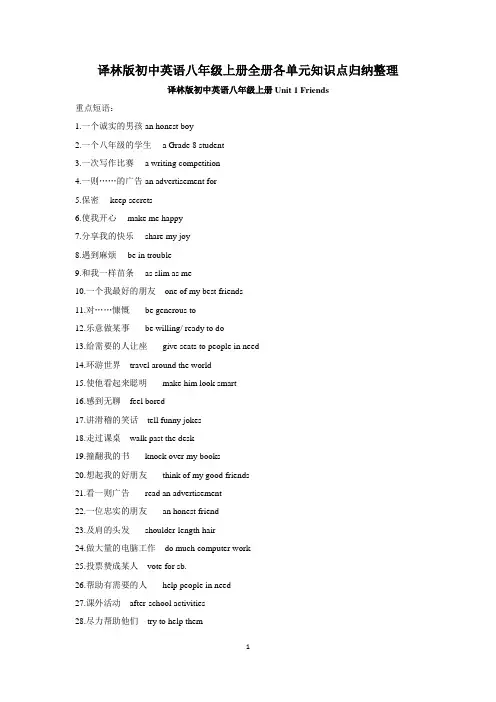
译林版初中英语八年级上册全册各单元知识点归纳整理译林版初中英语八年级上册Unit 1 Friends重点短语:1.一个诚实的男孩 an honest boy2.一个八年级的学生 a Grade 8 student3.一次写作比赛 a writing competition4.一则……的广告 an advertisement for5.保密keep secrets6.使我开心make me happy7.分享我的快乐share my joy8.遇到麻烦be in trouble9.和我一样苗条as slim as me10.一个我最好的朋友one of my best friends11.对……慷慨be generous to12.乐意做某事be willing/ ready to do13.给需要的人让座give seats to people in need14.环游世界travel around the world15.使他看起来聪明make him look smart16.感到无聊feel bored17.讲滑稽的笑话tell funny jokes18.走过课桌walk past the desk19.撞翻我的书knock over my books20.想起我的好朋友think of my good friends21.看一则广告read an advertisement22.一位忠实的朋友an honest friend23.及肩的头发shoulder-length hair24.做大量的电脑工作do much computer work25.投票赞成某人vote for sb.26.帮助有需要的人help people in need27.课外活动after-school activities28.尽力帮助他们try to help them29.一名社会工作者 a social worker30.未来计划future plans31.看起来爱好运动look sporty32.搬迁到北京move to Beijng33.过来come over34.想念我的老同学miss my old classmates35.与……交朋友make friends with36.给我一些忠告give my some advice37.住在隔壁live next door38.邀请某人做某事invite sb to do39.她微笑的眼睛her smiling eyes40.面带微笑wear a smile on one’s face41.再来一些饮料some more drinks42.一些喝的something to drink43.任何时间at any time44.在将来in the future45.对……很了解know sth. very well46.一个人坐着sit alone47.认识某人get to know sb.48.不如not as… as49.在做某事上有困难have problems doing sth.50.在某事上有困难have problems with sth.51.适合某事be suitable for52.和某人分享某物share sth with sb53.对某人友好be friendly to sb54.十年前ten years ago55.解出数学题solve the maths problem56.写信给某人write to sb57.说某人的坏话say a bad word about sb58.相信他说的话believe what he said/ his words59.倾听人们的难题listen to people’s problems60.帮助人们解决难题help people solve their problems61.因为……而出名be famous for62.作为……而出名be famous as63.个像艾伦那样的朋友have a friend like Alan64.在午餐期间during lunch time65.同意做某事agree to do66.同意某人的意见agree with sb67.在左边的那个男孩the boy on the left68.跑步最快的人the fastest runner69.A和B都both A and B重点句型:1.冰箱里没有别的东西。
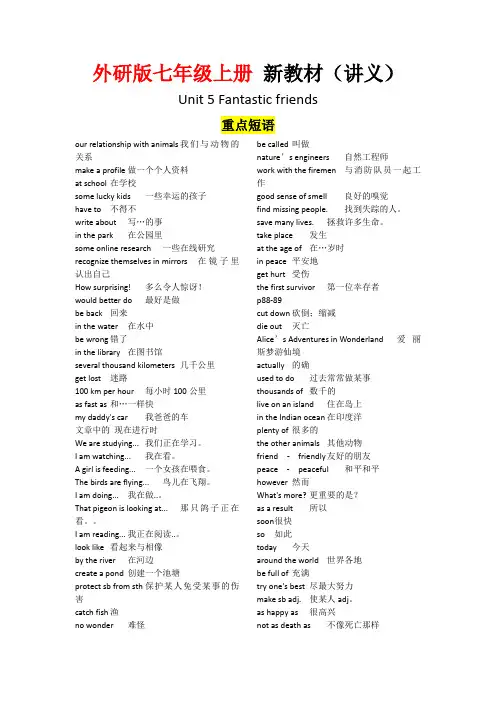
外研版七年级上册新教材(讲义)Unit 5 Fantastic friends重点短语our relationship with animals我们与动物的关系make a profile做一个个人资料at school在学校some lucky kids一些幸运的孩子have to不得不write about写…的事in the park在公园里some online research一些在线研究recognize themselves in mirrors在镜子里认出自己How surprising!多么令人惊讶!would better do最好是做be back 回来in the water在水中be wrong错了in the library在图书馆several thousand kilometers几千公里get lost迷路100 km per hour每小时100公里as fast as和…一样快my daddy's car我爸爸的车文章中的现在进行时We are studying...我们正在学习。
I am watching...我在看。
A girl is feeding...一个女孩在喂食。
The birds are flying...鸟儿在飞翔。
I am doing...我在做..。
That pigeon is looking at...那只鸽子正在看。
I am reading...我正在阅读..。
look like看起来与相像by the river在河边create a pond创建一个池塘protect sb from sth保护某人免受某事的伤害catch fish渔no wonder难怪be called叫做nature’s engineers自然工程师work with the firemen与消防队员一起工作good sense of smell良好的嗅觉find missing people.找到失踪的人。
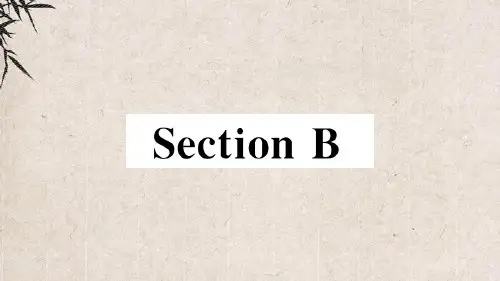
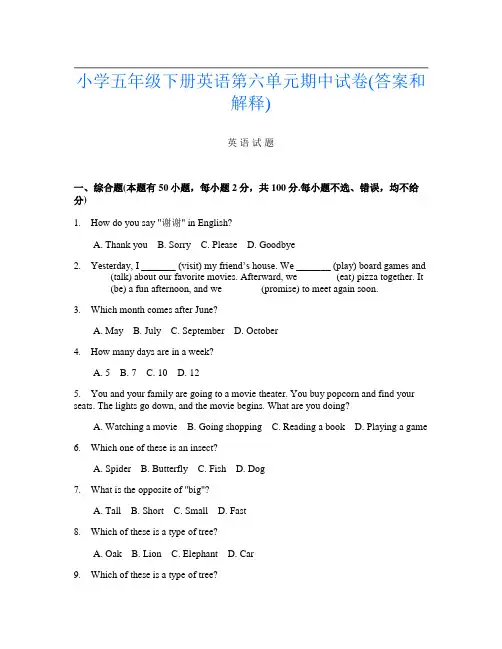
小学五年级下册英语第六单元期中试卷(答案和解释)英语试题一、综合题(本题有50小题,每小题2分,共100分.每小题不选、错误,均不给分)1.How do you say "谢谢" in English?A. Thank youB. SorryC. PleaseD. Goodbye2.Yesterday, I _______ (visit) my friend’s house. We _______ (play) board games and _______ (talk) about our favorite movies. Afterward, we _______ (eat) pizza together. It _______ (be) a fun afternoon, and we _______ (promise) to meet again soon.3.Which month comes after June?A. MayB. JulyC. SeptemberD. October4.How many days are in a week?A. 5B. 7C. 10D. 125.You and your family are going to a movie theater. You buy popcorn and find your seats. The lights go down, and the movie begins. What are you doing?A. Watching a movieB. Going shoppingC. Reading a bookD. Playing a game6.Which one of these is an insect?A. SpiderB. ButterflyC. FishD. Dog7.What is the opposite of "big"?A. TallB. ShortC. SmallD. Fast8.Which of these is a type of tree?A. OakB. LionC. ElephantD. Car9.Which of these is a type of tree?A. DogB. AppleC. OakD. Chair10.My brother and I are very different, but we get along well. He is taller than me, and he likes playing basketball. I prefer reading books and drawing pictures. Every evening, we play video games together. Sometimes, we argue about who gets to choose the game, but we always make up quickly. I’m happy to have a brother to share fun moments with.11.Which of these is a vegetable?A. CarrotB. BananaC. PearD. Apple12.What do we use to drink?A. SpoonB. CupC. PlateD. Knife13.They _______ to the zoo last Sunday.A. goB. goesC. wentD. going14.What do we use to tell the time?A. PhoneB. ClockC. BookD. Chair15.Which of the following is a pet?A. DogB. ElephantC. TigerD. Lion16.Which of these is a transport?A. bikeB. pencilC. spoonD. chair17.Which of these animals can swim?A. DogB. CatC. FishD. Bird18.Which sentence uses the possessive adjective correctly?A. This is his book.B. This is he book.C. This is him book.D. This is her books.19.Yesterday afternoon, I _______ (go) to the park with my friends. We _______ (decide) to play basketball. After a few minutes, I _______ (get) tired, so I _______ (sit) on the bench. My friends _______ (continue) to play, and I _______ (watch) them. Suddenly, my friend Tim _______ (fall) and _______ (hurt) his knee. We _______ (take) him to the doctor, and the doctor _______ (say) it _______ (be) nothing serious. Tim_______ (feel) much better after the visit.20.What do you eat for breakfast?A. PizzaB. SaladC. EggsD. Ice cream21.What is the opposite of "fast"?A. SlowB. QuickC. SpeedD. Heavy22.Which sentence uses the correct preposition for time?A. I have a meeting on Monday.B. I have a meeting at Monday.C. I have a meeting in Monday.D. I have a meeting by Monday.23.Which one is a season?A. summerB. carC. bananaD. mountain24.What do you use to clean your hands?A. TowelB. SoapC. ToothbrushD. Pen25.Which of these is a number?A. FiveB. SpoonC. ChairD. Plate26.Which sentence is correct?A. I will visit you at Monday.B. I will visit you on Monday.C. I will visit you in Monday.D. I will visit you at the Monday.27.Which one is a school subject?A. BreadB. MathC. TableD. Chair28.Which animal is known as "mans best friend"?A. CatB. DogC. BirdD. Fish29.Which of these is a fruit?A. TomatoB. CarrotC. PotatoD. Onion30.What do you need to do to clean the floor?A. EatB. SleepC. SweepD. Write31.What is the opposite of "new"?A. OldB. SmallC. LightD. Fast32.My dad ______ (work) at a bank. He usually ______ (leave) home at 8:00 and______ (come) back at 6:00. He ______ (like) his job because it ______ (be) interesting.I ______ (want) to be a teacher when I grow up.33.Which one is a color?A. ChairB. GreenC. SpoonD. Plate34.How do you say "晚安" in English?A. Good nightB. Good morningC. Good afternoonD. Goodbye35.Which animal barks?A. DogB. CatC. CowD. Bird36.What do you use to write on a board?A. PenB. EraserC. ChalkD. Paper37.How do you say "你好" in English?A. GoodbyeB. HelloC. YesD. Thank you38.What is the opposite of "hot"?A. ColdB. TallC. HeavyD. Bright39.Which of these is a shape?A. CircleB. SpoonC. ChairD. Car40.Which of these is a mammal?A. FishB. DogC. BirdD. Lizard41.Which of these is a day of the week?A. WinterB. JulyC. SundayD. Book42.Which of these animals is a kind of fish?A. SharkB. DogC. ElephantD. Bird43.Which of the following is a type of fruit?A. CarrotB. BananaC. PotatoD. Lettuce44.Which one is a day of the week?A. JanuaryB. MondayC. WinterD. Hot45.What do we use to clean our hands?A. TowelB. KnifeC. ForkD. Spoon46.Which animal can fly?A. catB. dogC. birdD. cow47.The cat _______ on the chair.A. sitB. sitsC. sittingD. to sit48.My mother ______ (be) a teacher. She ______ (teach) English at a local school. Every morning, she ______ (leave) home at 7:30. After work, she ______ (come) home and ______ (cook) dinner for our family. I ______ (love) her cooking.49.My family ______ (go) to the beach last weekend. We ______ (have) a great time. My brother ______ (build) a big sandcastle, and I ______ (collect) seashells. After that, we ______ (eat) some ice cream and ______ (watch) the sunset.50.Which of these is used to play music?A. PianoB. BrushC. KnifeD. Spoon(答案及解释)。
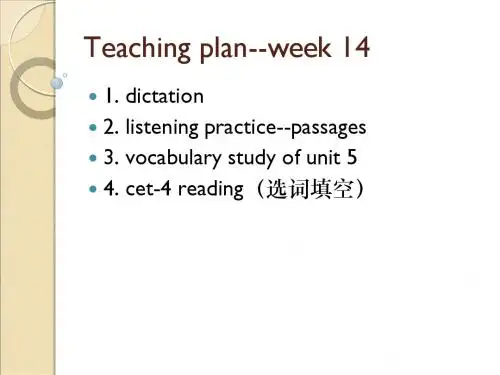
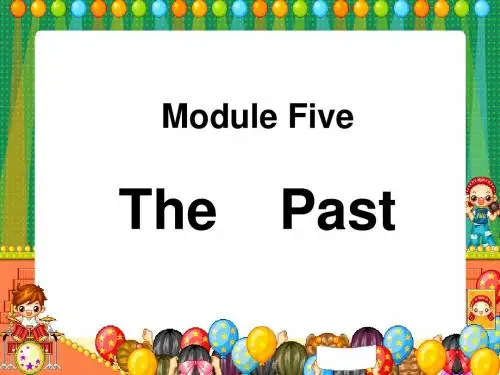
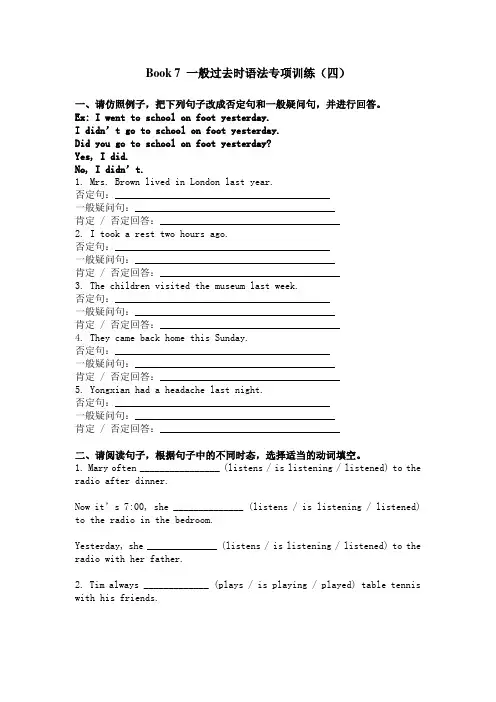
Book 7 一般过去时语法专项训练(四)一、请仿照例子,把下列句子改成否定句和一般疑问句,并进行回答。
Ex: I went to school on foot yesterday.I didn’t go to school on foot yesterday.Did you go to school on foot yesterday?Yes, I did.No, I didn’t.1. Mrs. Brown lived in London last year.否定句:___________________________________________一般疑问句:________________________________________肯定 / 否定回答:____________________________________2. I took a rest two hours ago.否定句:___________________________________________一般疑问句:________________________________________肯定 / 否定回答:____________________________________3. The children visited the museum last week.否定句:___________________________________________一般疑问句:________________________________________肯定 / 否定回答:____________________________________4. They came back home this Sunday.否定句:___________________________________________一般疑问句:________________________________________肯定 / 否定回答:____________________________________5. Yongxian had a headache last night.否定句:___________________________________________一般疑问句:________________________________________肯定 / 否定回答:____________________________________二、请阅读句子,根据句子中的不同时态,选择适当的动词填空。
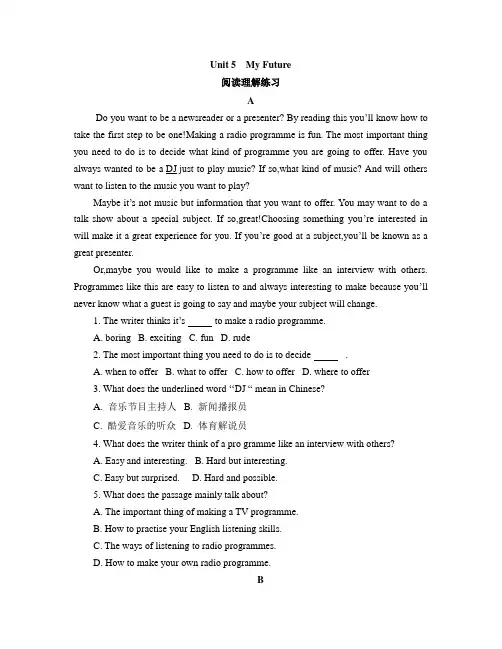
Unit 5 My Future阅读理解练习ADo you want to be a newsreader or a presenter? By reading this you’ll know how to take the first step to be one!Making a radio programme is fun. The most important thing you need to do is to decide what kind of programme you are going to offer. Have you always wanted to be a DJ just to play music? If so,what kind of music? And will others want to listen to the music you want to play?Maybe it’s not music but information that you want to offer. You may want to do a talk show about a special subject. If so,great!Choosing something you’re interested in will make it a great experience for you. If you’re good at a subject,you’ll be known as a great presenter.Or,maybe you would like to make a programme like an interview with others. Programmes like this are easy to listen to and always interesting to make because you’ll never know what a guest is going to say and maybe your subject will change.1. The writer thinks it’s __ to make a radio programme.A. boringB. excitingC. funD. rude2. The most important thing you need to do is to decide _ .A. when to offerB. what to offerC. how to offerD. where to offer3. What does the underlined word ‘‘DJ “ mean in Chinese?A. 音乐节目主持人B. 新闻播报员C. 酷爱音乐的听众D. 体育解说员4. What does the writer think of a pro gramme like an interview with others?A. Easy and interesting.B. Hard but interesting.C. Easy but surprised.D. Hard and possible.5. What does the passage mainly talk about?A. The important thing of making a TV programme.B. How to practise your English listening skills.C. The ways of listening to radio programmes.D. How to make your own radio programme.BTommy is from a poor family. His father is a worker and he is often ill. Tommy hopes to be an artist, but everybody says it is impossible for him to be an artist and makes fun of his family and his dream. But Tommy never gives up (放弃).One day, he heard there was a drawing competition the following week, and anyone aged 13 and up was welcome. The winner would get 10,000 dollars and some art equipment (设备). He thought for a minute and decided to take part in the competition.That week seemed like the longest week in his life. Every day when he got home from school, a pencil and a piece of paper were the first things in his hands. Then, the day of the competition came. He finished his drawing quickly.After two weeks, Tommy got a letter. Tommy was too afraid to open the letter. At last, he opened it slowly. Just as he read it, he began crying (哭). However, they were not tears (眼泪) of sadness... They were tears of happiness.1.Tommy hopes to be______.A.a workerB.a doctorC.a writerD.an artist2.The underlined words”makes fun of”means______in Chinese.A.嘲笑B.支持C.夸奖D.创造3.Which of the following is true according to Paragraph 2?A.The winner could get about 1,000 dollars.B.The winner could get some art equipment.C.Young boys couldn’t join in the competition.D.Anyone under the age of 13 could join in the competition.4.What did Tommy first do when he came back home before the competition?A.Practice drawing.B.Finish his homework.C.Cook dinner for his father.D.Watch news about the competition.5.What can we learn about Tommy from the end of the passage?A.He could never become an artist.B.He was sad because he didn’t win the competition.C.He was happy because he won the competition.D.He didn’t win the competition but he was still happy.CIn today’s world many people seem to be hungry for money. Some of them even have lost their lives for it. Money does have a great effect on the poor, but if a person has a rich life, a lot more money doesn’t mean more happiness.If money were everything, all millionaires(百万富翁)would have true love, real friendship, health and a long life. However, this is not always true.Nothing else is more pleasant than the three words “I love you”, but can love be bought? I’m afraid not. Love means “give”, not “ take”. Health and a long life are precious(宝贵的)things for every person. Well, can health and a long life be bought with money? The answer is “No”. Of all the people who live longest in the world, few of them are millionaires. Real friendship can’t be bought, either.In a word, where money is worshiped, money can cause brothers to quarrel, lovers to hate, strangers to fight and so on. No matter how much money you have, it is still not enough to make you a happy person if you have no one to laugh with and no one to cry for.1.What’s the most pleasant thing in the writer’s opinion?A. Money.B. Health and a long life.C. Friendship.D. Love.2.Which of the following is TRUE according to the passage?A. If you don’t have much money, you can’t get happiness.B.You may have a long life even if you are poor.C. Every year many people die because they are poor.D. If you are rich, you will have real friendship.3.The underlined word “ worship” means “_____” in Chinese.A. 崇拜B. 贬低C. 鄙视D. 挥霍4.What does the passage mainly tell us?A. Money is as important as true love.B. Money isn’t necessary.C. Money is important, but not the most important.D.Money can cause some problems.5.What does the underlined word “it” refer to?A. To make you a happy person.B. To have someone to laugh with or cry for.C. The money you have.D. Your opinion about money.DWhat will things be like in the year 2080? No one knows. But it is fun to have a guess at it.Let’s make this a story about you in the year 2080. Our story will beabout one day only. You wake up at seven in the morning. You get dressed. Guess what the clothes are made of? Paper? Glass? Or something we don’t even know about today.The breakfast is no work to fix. Why? The food may be ready for eating. Now you start for work. But you don’t go by car. You step onto a moving sidewalk. It moves you along to a train station. There you take a train. How will it run? On one rail high over the street? Or will it ride in air? Three o’clock comes. Your work is done for the day. “ I’ll call John , a friend of mine , “ you say.John answers the picture phone. You and he can hear and see each other.“What shall we do this Saturday?” you ask. “ Shall we put on our rocket belts and take a short trip? Or shall we go for a ride in a flying boat?”John may say , “I want to ride in a rocket ship ! Let’s fly to the moon ! “1. _ what things will be like in the year 2080.A. Some people knowB. Nobody knowsC. Scientists have found outD. Only a few clever people know2. In the year 2080 the clothes we wear will be _ those we are wearing now.A. the same asB. heavier thanC. stronger thanD. different from3. You may not need to spend any time _ in the year 2080.A. eatingB. sleepingC. cookingD. traveling4. You will take _ to go to work.A. a special trainB. a busC. a carD. a plane5. Probably you can travel to the moon _ in the year 2080.A. in a trainB. easilyC. with much difficultyD. in a carEA report from the United Nations (UN) says the world needs another 69 million teachers by the year 2030. The UN agency LJNESCO made a promise in 2015 that every child in the world is to receive primary and secondary education within the next 14 years. Now there are 263 million who do not go to school. Around 25 million of these might never get an education The agency says a lot of work needs to be done to find enough teachers for schools. The most teachers are needed in sub-Saharan__(撒哈拉沙漠以南的) Africa and Southern Asia.The UN report warns that there are not enough teachers in countries with rising populations. This makes it harder to find enough teachers. It says,”Without quick and continuing action, the situation will become worse in the face of rising need for education.” UNESCO is also worried about the quality (质量) of teachers in some countries. In countries like Ghana, Liberia and Sierra Leone, fewer than 60 percent of teachers in primary schools have been trained. There are also worries about class sizes. The LIN says, “In countries like Malawi, it is common to find over 100 children in one class. This has been a problem for many years.”1.How many children around the world might never get an education?A. More than 69 million.B. About 25 million.C. About 263 million.D. Less than 14 million.2.From the underlined sentence, we can learn that sub-Saharan Africa and Southern AsiaA. are full of teachersB. are popular with teachersC. are very short of teachersD. will invite more teachers3.It’s difficult to find enough teachers in some countries becauseA. people don’t like to be teachersB. the governments pay no attention to educationC. they are too poor to call in teachersD. there are more and more children being born.4.What can we infer from the passage?A. 300 million children do not go to school at present.B. It’s not very difficult to find enough teachers for schools.C. In Liberia, more than 60% of teachers have been trained.D. There are too many students in a classroom in Malawi.5.The writer’s purpose for this passage is toA. let people know the educational situationB. advise people to become teachersC. encourage people to help poor childrenD. tell people the importance of education参考答案A. 1-5 CBAADB. 1-5 DABACC. 1-5 DBACCD. 1-5 BDCABE. 1-5 BCDDA。
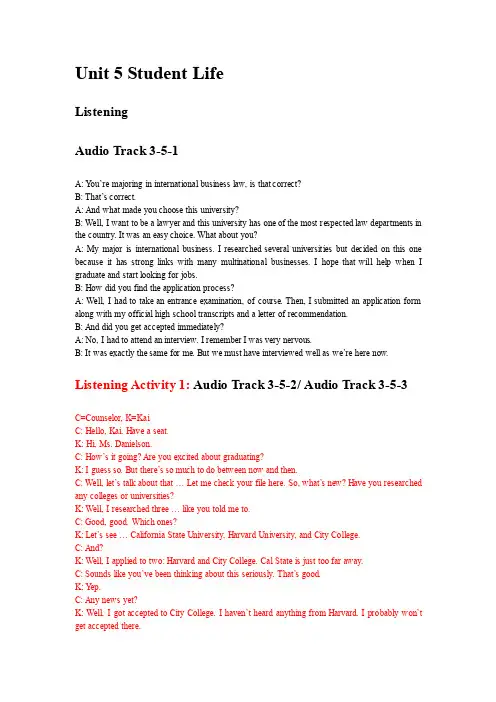
Unit 5 Student LifeListeningAudio Track 3-5-1A: Y ou’re majoring in international business law, is that correct?B: That’s correct.A: And what made you choose this university?B: Well, I want to be a lawyer and this university has one of the most respected law departments in the country. It was an easy choice. What about you?A: My major is international business. I researched several universities but decided on this one because it has strong links with many multinational businesses. I hope that will help when I graduate and start looking for jobs.B: How did you find the application process?A: Well, I had to take an entrance examination, of course. Then, I submitted an application form along with my official high school transcripts and a letter of recommendation.B: And did you get accepted immediately?A: No, I had to attend an interview. I remember I was very nervous.B: It was exactly the same for me. But we must have interviewed well as we’re here now. Listening Activity 1: Audio Track 3-5-2/Audio Track 3-5-3C=Counselor, K=KaiC: Hello, Kai. Have a seat.K: Hi, Ms. Danielson.C: How’s it going? Are you excited about graduating?K: I guess so. But there’s so much to do between now and then.C: Well, let’s talk about that … Let me check your file here. So, what’s new? Have you researched any colleges or universities?K: Well, I researched three … like you told me to.C: Good, good. Which ones?K: Let’s see … California State University, Harvard University, and City College.C: And?K: Well, I applied to two: Harvard and City College. Cal State is just too far away.C: Sounds like you’ve been thinking about this seriously. That’s good.K: Y ep.C: Any news yet?K: Well, I got accepted to City College. I haven’t heard anything from Harvard. I probably won’t get accepted there.C: Why do you say that?K: Y ou know … it’s so competitive. I don’t think my grades are good enough.C: Well, let’s wait and see.K: I’ll probably go to City College. My brother went there. I visited the campus and I like it.Listening Activity 2: Audio Track 3-5-4/Audio Track 3-5-5Lucia: And finally today, we have a report about graduating seniors. Jason Kim is standing by. …Jason, are you there?Jason: Hi, Lucia.Lucia: The Metro Times newspaper asked college seniors, “What are you going to do after you graduate?”Jason: That’s right, Lucia. The students gave some surprising answers, too.Lucia: For example …?Jason: Well, more than 50 percent of the students say that they aren’t going to start a new job right away.Lucia: Well, what are their future plans?Jason: Let’s ask some of them. … Excuse me.Mizuki: Y es?Jason: I’m Jason Kim from XCA-TV. Y our name, please?Mizuki: Mizuki.Jason: And what are you studying?Mizuki: Art.Jason: OK, Mizuki, what are you going to do after you graduate?Mizuki: I don’t know. I’ll probably just chill out for a while.Jason: Chill out?Mizuki: Y ou know, relax.Jason: OK, Mizuki. Thanks for your comments. … Hello, I’m Jason Kim and we’re doing a live report. What’s your name and major?Ro bert: My name is Robert and I’m studying law.Jason: What are you going to do after you graduate?Robert: I don’t know … maybe I’ll take a long trip.Jason: What about a job?Robert: Work? Maybe one of these days. But first I’d like to take a trip.Jason: Thank you, Robert, and good luck. Well, that’s all for now. This has been Jason Kim, with my report on college seniors. Now, back to you, Lucia …Listening Activity 3: Audio Track 3-5-61. Hi, I’m Eduardo. I got accepted to college recently. Since the s chool is just in my neighborhood, I’m going to live at home. I will not apply for a scholarship because it is too hard to get it. I think I’ll be able to support myself by working part-time. In my view, money is veryimportant though it is not everything.So most probably I’ll study business. I hope I can make it big after graduation.2. I’m Jill. I’m going to join a sorority. I want to make more friends of the same sex. I think that women should be united and should always help each other. I’m going to d o volunteer work in my spare time to help those elderly ladies in the community with their errands. I’m not going to a large university since I can’t afford it.3. I’m Max and this is Sara. We love each other. We’re not going to live in student housing. We plan to live in a medium-size apartment not far away from the university. We’re going to study together and work part-time.Audio Track 3-5-7I’m Mary and I’m twenty. I’m studying Lifelong Education at the University of Tokyo. I think it’s important f or everyone to keep learning all their lives. That’s why I chose to major in Lifelong Education. Personally, I’m planning to further my education in an American university after graduation. So right now, I’m taking an English class. I want to improve my English. I’m working part-time at a video store because I need to save money for my studies abroad.I have a boyfriend and he wants to go and study in the United States too. We have similar interests and personalities. I’m going to get married and live in a house by the ocean. Sooner or later, I’ll have my own children. I will most probably stay at home to be a full-time mother before my children are sixteen years old. To witness their growth would be the most valuable thing in my life.Listening Activity 4: Audio Track 3-5-8/Audio Track 3-5-9New graduates talk about the futureAfter the City College graduation ceremony yesterday, we talked to three students about their plans and their dreams.Here is what Jameela Brown had to say about her future:I worked so hard for four years. I need a break now! I majored in biology and chemistry, and I hada summer job in a day care center. I’m going to take a year off before I start medical school. My plan is to travel and do volunteer work in West Africa. I’ll be a doctor someday but I’m not sure what kind of doctor I’ll be.Jennie Min talked about her plans:I studied business, and it was easy for me to find a job. Next month I’ll move to New Y ork to start work at Giant Corporation. But I don’t really want to spend my whole life working for a company.I hope I can start my own business. Maybe something with food. I love cooking! In college, I cooked dinner for my roommates every night.Shane Peterson told us about his big dream:Wow! Four years really went fast. I c an’t believe it’s graduation day! My major was computer science, but I spent all my free time playing music. I played guitar in two different bands. I also play electronic music, using computers. I have job interviews with three software companies nextwee k. I’m not worried about getting a job, but I really want to play music, too. That’s my biggest dream.Listening Activity 5: Audio Track 3-5-10/Audio Track 3-5-11Interviewer: We now have a winner! Stephanie Lee from V ancouver, Canada answered our ques tions and won the top prize: She will be our youth travel reporter in Europe! She’s going to travel for three months and write about her experiences for our website. Do you have any international travel experience?Stephanie: Y es, I do. Two years ago, I spent the summer in Hong Kong, China. I stayed with my grandmother and worked in the family business. I also visited Africa last year.Interviewer: What do your travel experiences tell us about you?Stephanie: I stayed in Hong Kong for about two months. I think that shows I can stay away from home for a long time. I don’t get homesick at all. In Africa, I went to Tanzania. The highlight was climbing Mount Kilimanjaro. It’s the highest mountain in Africa. The climb was very hard. Two people turned back before they reached the top. I made it all the way! Once I start something, I never give up.Interviewer: This job gives you a digital camera and pays your travel expenses. It doesn’t pay a salary. How will you get your spending money?Stephanie: I had a part-time job in a restaurant. I had worked there for two years. Fortunately, I saved a lot of money, so I won’t have to worry about money for my trip to Europe. Interviewer: Why should we choose you?Stephanie: Because I love to travel! I’m a hard worker a nd will have no trouble filing reports on time — and I have a lot of energy!Speaking & CommunicationAudio Track 3-5-121. I’m gonna apply to three colleges.2. He’s gonna clean the house next week.3. We’re gonna study together for the big exam.4. T hey’re not gonna finish in time.Audio Track 3-5-131. I’m not gonna meet them before 3:00.2. We’re not gonna take a vacation this summer.3. She’s gonna call us tomorrow.4. He’s not gonna attend Harvard University.Audio Track 3-5-14Hans: Hi, Tom. What’s new?Tom: Well, I’m going to start at a new high school this fall.Hans: Which one?Tom: Essex Academy. It’s a boarding school. It’s a five-hour drive from my parents’ house. Hans: Does boarding school mean you live there? On campus?Tom: Exactly.Hans: That sounds awesome!Tom: Y eah. I think it’s going to be cool.Audio Track 3-5-15A: I study hard and get good grades. I’m usually on the honor roll.B: What does honor roll mean?A: It’s a special list for students with very good grades.B: Oh, I see. Well, I like study hall. I can do my homework and prepare for exams.A: I don't understand. What do you mean by study hall?B: It’s a time that is reserved for quiet study.Audio Track 3-5-16A: Are you free at noon tomorrow?B: No, I’m not. I’m goi ng to eat lunch with my friends then. How about 2:00 p.m.?A: Sorry, but that doesn’t suit me. I’m going to get a flu shot at 2:15.B: Oh, really?A: Y eah. The doctor strongly advised me to do it.B: Then how about 7:30 p.m.?A: That’s all right for me. Se e you then.Video CourseVideo Track 3-5-1Agnes: After I finish my Ph.D. I would like to go back to Senegal and start my own business in agriculture.Brad: After I graduate I will move to Washington, D.C., to work for National Geographic. Calum: After I graduate I’d like to have a good job that pays a lot of money, and to travel and see the world.Dave: After I graduate from college I will go to graduate school and I’m going to study art. Alex: After graduation I plan to find a good job. I also plan to start a family and buy a house. Julianna: I want to start my own business, an import-export business.Alejandra: My students work very hard and get good grades to get into university.After finishing their degrees in the United States they will go home and either work with their families or open a business.Video Track 3-5-2Dave: Five years from now I will still be studying and I don’t know where I’m going to live. Calvin: I’d like to become a lawyer and I’d like to specialize in cyberlaw. I think c yberlaw will be pretty big within five, six years or so.Woo Sung: I’ll probably be married. I want about three kids, a dog, my own house, and a job that I enjoy. And you know most of all I just want to be … just I guess … enjoy my life.Video Track 3-5-3Mike: Do you think he was accepted?Sun-hee: I don’t know …Mike: Any news from Harvard?Sun-hee: He was rejected. He also applied to the University of Southern California, and they didn’t accept him either. It’s too bad. He studied so hard in film schoo l. And he got really good grades …Mike: I know. And he researched all those schools and applied for all those scholarships … I hope he gets in. Hey, do you know what he’s going to do if he doesn’t get into grad school?Sun-hee: No, what?Mike: He’s going to hit the road.Sun-hee: I don’t understand. What do you mean?Mike: He’s going to buy a nice camera and travel around Europe taking photos for his brother’s website.Sun-hee: Now that would be an experience, but it’ll be sad if he goes.Mike: He’ll get in … I just know it!Takeshi: (enters front door) Hi!Sun-hee: Takeshi!Mike: There’s a letter for you from the Columbia graduate school.Sun-hee: (takes letter from Mike) Uh, uh, uh! Now let’s think about this for a moment. What are you going to do if you aren’t accepted?Takeshi: Well, like I said, I’m going to travel around Europe for a while. And then I’ll apply to graduate school in a few years …and I will get in!Mike: (takes letter from Sun-hee) What will you do if you are accepted?Takeshi: Oh, that’s easy. I’m going to become a film director.Mike: (gives letter to Takeshi) All right then … here. (waits for Takeshi to open letter) Well! What are you waiting for? Open it!Takeshi: Here goes … (opens letter)Sun-hee: Well?Mike: Were you accepted?Tak eshi: I’m going to grad school!Video Track 3-5-4Mike: Do you think he was accepted?Sun-hee: I don’t know …Mike: Any news from Harvard?Sun-hee: He was rejected. He also applied to the University of Southern California, and they didn’t accept him either. It’s too bad. He studied so hard in film school. And he got really good grades …Mike: I know. And he researched all those schools and applied for all those scholarships … I hope he gets in. Hey, do you know what he’s going to do if he doesn’t get in to grad school?Sun-hee: No, what?Video Track 3-5-5Mike: He’s going to hit the road.Sun-hee: I don’t understand. What do you mean?Mike: He’s going to buy a nice camera and travel around Europe taking photos for his brother’s website.Sun-hee: Now that would be an experience, but it’ll be sad if he goes.Mike: He’ll get in … I just know it!Takeshi: (enters front door) Hi!Sun-hee: Takeshi!Mike: There’s a letter for you from the Columbia graduate school.Video Track 3-5-6Sun-hee: (takes lett er from Mike) Uh, uh, uh! Now let’s think about this for a moment. What are you going to do if you aren’t accepted?Takeshi: Well, like I said, I’m going to travel around Europe for a while. And then I’ll apply to graduate school in a few years … and I wil l get in!Mike: (takes letter from Sun-hee) What will you do if you are accepted?Takeshi: Oh, that’s easy. I’m going to become a film director.Mike: (gives letter to Takeshi) All right then … here. (waits for Takeshi to open letter) Well! What are you waiting for? Open it!Takeshi: Here goes … (opens letter)Sun-hee: Well?Mike: Were you accepted?Takeshi: I’m going to grad school!Audio Track 3-5-17Takeshi got a letter from the Columbia Graduate School. While Sun-hee and Mike were waiting for him to c ome home, they talked about Takeshi’s plans for grad school. Takeshi had applied to several graduate programs, but two schools had already rejected him! Mike said that Takeshi was going to hit the road if he didn’t get accepted. When Takeshi got home, he e xplained that if he didn’t get accepted he was going to travel for a while and then he would apply to graduate school again. He also said that if he was accepted, he was going to become a film director. Takeshi finally opened the letter — and it was good news! Takeshi was going to go to grad school at Columbia!。
课时分层作业(十三) Section Ⅰ(建议用时:35分钟)[高考题型练习提能力]Ⅰ.阅读理解AJ. K. Rowling turned another year older this week. Born Joanne Rowling, J. K. Rowling is, of course, her adopted pen name. Concerned that young boys might not go for a book written by a woman, her publisher suggested she come up with a pseudonym(笔名). So, upon combining her first initial with the initial of her paternal grandmother, Kathleen, the moniker J. K. Rowling was born.That's the interesting fact about Rowling, apparently, and she can only fool some of the people some of the time.Back in 2013, a crime novel appeared on the shelves. It was entitled The Cuckoo's Calling, and it was written by Robert Galbraith. According to Galbraith's bio, he spent “several years with the Royal Military Police” and the leading character of his novel, a fellow by the name of Cormoran Strike, “grew directly out of his own experiences and those of his military friends.”Only, upon further review, he didn't! The book was actually penned by J. K. Rowling, who apparently wanted to try and sell a novel based on complete craftsmanship rather than on her name.Unfortunately, however, the wife of a partner in the media in whom she placed her trust, shared the secret on Twitter. Rowling was angry and disappointed concerning the betraying of trust.I'm not sure whether I would be terribly upset for too long,if I were her. Previous to her being known as the author,Rowling saw her book listed 4,709th on Amazon. After the big revelation, her book jumped all the way to No. 1!More importantly, I think she got what she wanted. The novel has received nearly universal critical acclaim. Rowling passed her own test with flying colors. Clearly, she's pretty good at her craft!In any case, I personally look forward to reading her newest writing endeavor.【语篇解读】本文主要报道了J.K. Rowling用其他名字写书这一秘密暴露一事。
Section II ReadingandThinking(l)课文语篇研读 Step 1 Pre-reading 1. Discussing -Look at the following pictures and answer the questions. The answer is open. (2)Look at the following pictures and answer the questions : What can money buy? What can,t money buy?The answer 、is- open.2. Predicting -Look at the title on Page 52 and predict what the text is probable about?The text mainly tells us something about a famous play The Mi llion Pound Bank Note .Step 2 While-reading1. First reading -Read the two passages carefully and answer the followingquestions.(1)What bet did Roderick and Oliver make?They_made —a_bet —on_whether_a__man_can_live_in_London_for_a_ month 、 with a million —pound bank note.(2)How did Henry come to England?活动设计素养形成(1)Would you like to be a millionaire like the following people ? Why or why not?Vsirieiies of ihimgg Lovz FriendshipHenry landed in _London by accident.(3)How does Henry want the brothers to help him?Give him a job to _earn an honest income.(4)Why do you think Henry does not want the brothers, charity?The answer is open.(5)Why do you think the brothers choose Henry for their bet?The_answer_is_open.2.Second reading-Fill in the blanks according to the passage.They hwnl whether wilh n millionpound bank note a man could livt a taxah in Londonand. nisdc a3.Third readingSummarizing :Read the text again and try to summarize the main idea in one sentence.The_ passage__is__qbout_ a _§tory _that__@fter_ arriving at 」he__UK__Henry was given an envelope with money by two wealthy brothers.Post-reading1.Group work:If you are a journalist of your school English newspaper, please make an interview with Henry according to the text.You may start like this.A:Hello, I,m a journalist of our school English newspaper.What do you think of the million pound bank note?B:...2.Since everyone has many dreams to realize, what should you do if you are given the million pound bank note?The answer is open.阅读技巧点拨如何预测课文内容?1.By looking at the pictures in the passage.2.By thinking about the content before reading.3.By relating what you will read to what you have known.语言现象感知I .单词理解体会句中加黑单词的词性和含义1.Is money the basis of a happy life? n .基础2. Chen spent all her savings and took out a large loan. n .贷款;借款3. Chen found 10 , 000 yuan in a small plastic bag in Taiyuan railway station. adj.塑料做的4. Wang Zheng apologised to Chen because he couldn ’t offer her more money. vt.道歉5. Should we judge people based on how much money they have? vt.判断;评判II.词块积累写出下列词块的含义1.on the basis of 根据某事2. raise funds筹集资金3. take out a large loan 取得一大笔贷款4. set up a fundraising website 建立筹钱网站5. draw a conclusion 得出结论6. get something in return得到某物作为回报III.句式欣赏1.不定式作目的状语Wang built a website to help raise fUnds for Liu Xia.2.because引导原因状语从句Wang Zheng apologised to Chen because he couldn’t offer her more money 3.after引导时间状语从句Wang set up a fundraising website for Chen,s daughter after Chen told him about her situation.4.第几次做某事It was the first time Chen Liyan,s story had been recorded.5.how much引导宾语从句Should we judge people based on how much money they have?课堂实践应用语言内化稳理能AFor most of us, it seems that money makes the world go around.But it is not true for Mark Boyle, who has turned his life into an experiment and promised to live without any form of money.The British economics graduate was inspired by Gandhi,s call to be the change you want to see in the world.After six years working as the manager of a company , he decided to carry out a brave plan.“I was discussing the world,s problems with a friend one night, and we were trying to work out which one to devote our lives to helping solve ”, he said. “Then it hit me because at the root of it all was money , so I decided to see if it was possible to do without. ”Mark sold his houseboat to prepare himself for his new life.And he got a caravan (大篷车)through an advertisement.The caravan was taken to the farm where he was to volunteer three days a week in return for space to live and grow his own vegetables. Although it hasn,t always been easy, and there have been many challenges, 18 months later.Mark is still living this way.“The first few months were hard.” he admitted. “ If you think about how annoying it is when you just move your house or change a job , imagine changing everything at once.But after several months, it became very easy.Mark,s remarkable journey is recorded in his new book, The Moneyless Man, which explains that human society is fairer, happier and more secure when relationships are not influenced by money.【语篇解读】本文是一篇记叙文。
Unit Five1、Background Introduction“工作狂”这三个字,怎么都不觉得是褒义词,但我又认为发明这个词的人一定是带有某种感情色彩的,那到底应该是什么呢?先说工作狂是幸福的。
既然工作着,说明找到了自己的领域,还能狂,表示投入了很大的精力,所以捎带也就提高了业务水平,增加了求职升职的砝码。
甚至很多人和朋友聊天时也是三句不离本行,醉心于工作的点点滴滴。
一个工作狂,大多是他主动要成为一个工作狂,懂得工作并快乐着,时不时忙里偷闲一番,工作不但不会摧垮身心,反而会成为快乐生活的滋补品。
我们开始工作的第一天算起,工作究竟是为了什么?开始是为了生存,后来是为了兴趣,最后暂且说是理想吧。
毕竟最初的梦想最后又当真在做的人少数,那些人是幸福的,我相信他们有足够的激情完成自己的工作。
我相信工作狂一定是要有所平衡的东西,如果你觉得电视剧能让你更全情地投入工作,当然也可以选择看电视。
只是担心那些总想趁年轻一再透支健康的人,难道真的除了工作能一言不发?还是在日常生活中给自己一些奖励,去喜欢的餐馆大吃一顿,或者经营一下与家人的关系,陪太太到喜欢的商店逛逛,这样多好。
其实我们的社会还是很需要工作狂的,但我们也要看清,太多的人用全部的努力,不过换来了普通的生活。
如果就像两个爬山,一个人永远向往远处的风景,一个人却始终留意欣赏路边的风景,谁更辛苦呢?由此可见工作狂不等于“过度工作者”,工作狂能够在工作中享受人生。
2、Analyzation of the TextParagraph 1第一段为文章的引言部分Paragraphs 2-6这一部分介绍了本文的主人公怎样献身于工作。
Paragraphs 7-13这一部分介绍了菲利在家中的作用。
Paragraphs 14-16这三段为文章的结尾部分。
在重新提起菲利的死亡原因之后,作者继续阐述了公司的总裁对于菲利的接任者的质询。
3、Words study文中出现的重难点单词:survive1. survive v. to live honger than; to outlive幸免于,幸存;比……长命<释例>He survived the crash only to die in the desert. 他虽然在飞机坠毁时幸免于难,但却死在沙漠里。
小学三年级上册英语第五单元期测验题(答案和解释)英语试题一、综合题(本题有50小题,每小题2分,共100分.每小题不选、错误,均不给分)1.Which of these is used to read?A. BookB. ShoeC. SpoonD. Cup2.How many fingers do we have on one hand?A. 5B. 6C. 4D. 103.What do we wear on our head?A. HatB. ShoesC. GlovesD. Scarfst summer, my family and I _______ (go) on a vacation to the beach. We _______ (stay) in a hotel near the ocean. Every day, we _______ (swim) in the sea and _______ (build) sandcastles on the beach. My sister _______ (collect) seashells, while I _______ (watch) the sunset. In the evening, we _______ (eat) seafood at a nice restaurant. It_______ (be) an amazing vacation.5.My school is organizing a talent show next month. I am going to participate by singing a song. I am practicing every day to make my performance perfect. My friend Sarah will play the __ to accompany me, and we hope the audience will enjoy our __.6.Where do you sleep?A. CarB. BedC. KitchenD. Bathroom7.Which one is used for reading?A. BookB. PlateC. SpoonD. Fork8.What do we use to drink?A. CupB. KnifeC. PlateD. Spoon9.Which of these is a vegetable?A. CarrotB. AppleC. PearD. Banana10.Which sentence uses the possessive adjective correctly?A. This is your book.B. This is you book.C. This is he book.D. This is his book.11.Which of the following is a school subject?A. CookingB. MathC. SwimmingD. Shopping12.Which of the following is a type of weather?A. CloudB. RainC. ChairD. Tablest Saturday, my family and I went on a picnic in the park. We packed a basket with sandwiches, fruit, and some __. I also brought my favorite book to read while sitting on the blanket. My little brother liked playing with a __ and running around the park. We stayed for a few hours and enjoyed the sunshine.14.How many fingers do you have on one hand?A. FourB. SixC. FiveD. Ten15.Which animal is known for its ability to swim?A. DogB. CatC. FishD. Bird16.This morning, I _______ (wake) up early and _______ (eat) a big breakfast. After that, I _______ (go) to the park to meet my friends. We _______ (play) basketball for an hour, and we _______ (have) a lot of fun.17.Every Saturday, I go to the park with my family. We play games like soccer and basketball. My brother is really good at playing soccer. He kicks the ball into the net, and we all cheer. After playing, we sit on the grass and eat sandwiches with some __. Sometimes, we also have __ for dessert.18.Which of these is a vehicle?A. CarB. BookC. TableD. Chair19.Which color is a banana?A. RedB. BlueC. YellowD. Green20.What is the color of the sky?A. RedB. GreenC. BlueD. Yellow21.Which of these is a fruit?A. CarrotB. PearC. OnionD. Potato22.My father ______ (be) a great cook. He ______ (make) delicious meals for our family every evening. Yesterday, he ______ (cook) spaghetti for dinner, and it ______ (taste) amazing. We all ______ (enjoy) the meal and ______ (ask) him to cook it again soon.23.Which of these is a tool?A. HammerB. CarC. DogD. Plate24.What do you call a baby dog?A. KittenB. CalfC. PuppyD. Cub25.What do we use to drink water?A. SpoonB. CupC. KnifeD. Plate26.Which of these is used to write?A. PenB. SpoonC. KnifeD. Plate27.Which one is a type of food?A. PencilB. BananaC. BookD. Shirt28.Which one is a color?A. GreenB. DogC. TableD. Carrot29.Which of these is an insect?A. CatB. ButterflyC. DogD. Elephant30.What is the opposite of "light"?A. HeavyB. TallC. FastD. Slow31.I enjoy playing sports, especially soccer. Every Saturday, my friends and I play soccer in the park. We have a lot of fun, but sometimes it gets very hot, so we take breaks and drink water. I hope to play in a soccer team someday.32.My cousin ______ (visit) us last weekend. He ______ (stay) at our house for two days. We ______ (go) to the park and ______ (play) soccer. He ______ (be) very good at soccer, so we ______ (have) a lot of fun. I ______ (hope) he can visit us again soon. 33.I like going to the library because it is full of interesting books. There are books about __, animals, space, and many other topics. I always take a few books home to read. My favorite books are about __, especially the ones with pictures. I love reading and learning new things.34.What do you use to brush your teeth?A. CombB. ToothbrushC. TowelD. Scissors35.How many days are there in a week?A. 7B. 5C. 6D. 1036.Which animal is known for being very slow?A. CheetahB. SlothC. TigerD. Rabbit37.What do we wear on our head?A. GlovesB. ShoesC. HatD. Scarf38.I ____ like ice cream.A. don’tB. notC. isn’tD. am39.Which animal has a long neck?A. TigerB. GiraffeC. ElephantD. Dog40.Which animal lives in water?A. DogB. FishC. CatD. Bird41.What color is the sun?A. YellowB. BlueC. GreenD. Red42.Which animal lives in the water?A. LionB. FishC. TigerD. Elephant43.Which one is a fruit?A. OnionB. PineappleC. LettuceD. Potato44.I like to help my parents at home. I clean my room, wash the dishes, and take out the trash. Sometimes, I help my father in the garden, too.45.What do we drink when we are thirsty?A. FoodB. JuiceC. BookD. Pencil46.Which of these is used to make bread?A. SpoonB. KnifeC. ForkD. Flour47.My grandmother lives in a big house in the countryside. There are many flowers and trees in her garden. In the summer, she grows vegetables like tomatoes and cucumbers. I love visiting her because I can help her water the plants and pick the vegetables.48.Which of the following is a form of transportation?A. CarB. TreeC. BuildingD. Book49.I _______ like ice cream.A. notB. do notC. don’tD. none50.My dad ______ (work) in an office. Every day, he ______ (leave) for work at 8:00 in the morning. After work, he ______ (come) home at 6:00 in the evening. Last Friday, he ______ (bring) home some pizza, and we ______ (eat) it together.(答案及解释)。